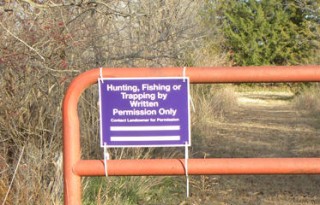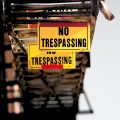Is The Landowner Protection Act Being Enforced In North Carolina?
 By now, most landowners and hunters are aware of the Landowner Protection Act, a law that became effective on October 1, 2011. The purpose of the Landowner Protection Act is to strengthen and clarify the existing trespass laws in North Carolina.
By now, most landowners and hunters are aware of the Landowner Protection Act, a law that became effective on October 1, 2011. The purpose of the Landowner Protection Act is to strengthen and clarify the existing trespass laws in North Carolina.
What Does the Landowner Protection Act Do?
The major elements of the Landowner Protection Act are as follows:
- It defines the requirements for written permission to hunt, fish or trap on posted land.
- It allows landowners to post land using purple paint marks in addition to placing signs or posters as was previously allowed.
- It allows wildlife enforcement officers to enforce trespass laws on site.
Under the act, anyone hunting, fishing or trapping on posted land is required to have yearly written consent signed by the landowner, lessee or agent of the landowner. This written consent has to be displayed upon the request of any law enforcement officer.
Will Law Enforcement Strictly Enforce the Landowner Protection Act?
From both my experiences in Court and my discussions with a number of wildlife enforcement officers, the answer is “absolutely!” I have seen an increasing number of trespass cases on the Court docket. NC Wildlife enforcement officers that I have talked with take the position that, no matter how long you have hunted, fished or trapped a tract of land or how well you know the landowner, if you do not have the written permission required, you will receive a citation if the land has been properly posted.
If you are hunting, fishing or trapping on land that is properly posted, a good practice would be to get your permission slip every year when you obtain your hunting, fishing or trapping license. Always keep both your license and permission slip on your person and available for display to the law enforcement officer.
The North Carolina Wildlife Resources Commission website, www.ncwildlife.org, has provided a sample written permission form that meets all the requirements. The website can also answer many questions you may have in regards to the Landowner Protection Act.
Speak with Legal Council about Trespassing Charges in North Carolina
If you have been charged with criminal trespassing, call 919-615-2473 or request a case review from the attorneys at Kirk, Kirk, Howell, Cutler & Thomas.
Protecting your Privacy ~ Your privacy is our primary concern. At Kirk, Kirk, Howell, Cutler & Thomas, LLP., we understand the importance of protecting your privacy and will never share your contact information with a 3rd party. Contacting our law firm does not imply any form of attorney-client relationship.
Information presented on this website should not be construed as formal legal advice or the formation of an attorney-client relationship. Additionally, any email sent to Kirk, Kirk, Howell, Cutler & Thomas, L.L.P. or any of its lawyers at the email addresses set forth in this website will not create an attorney-client relationship.













